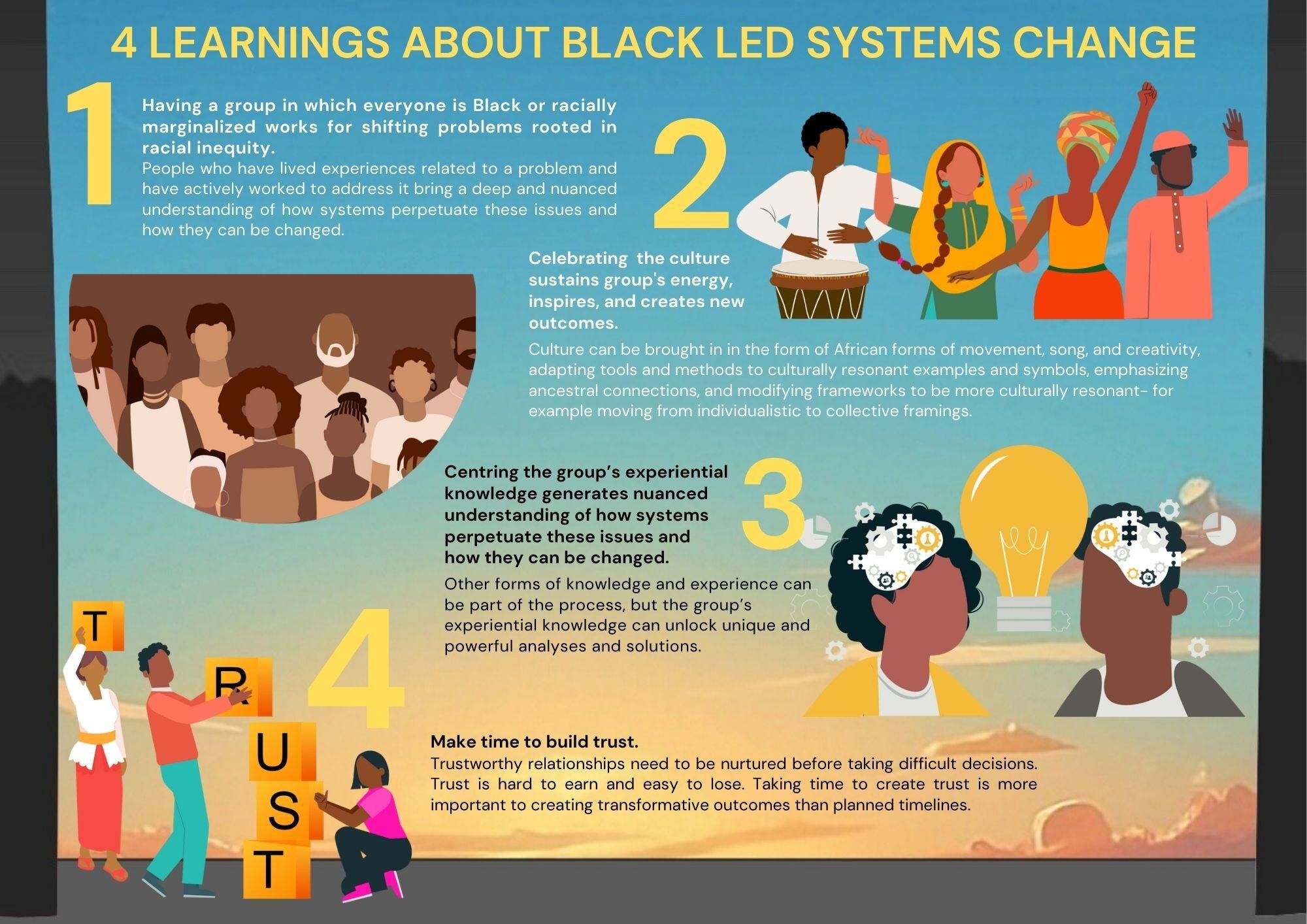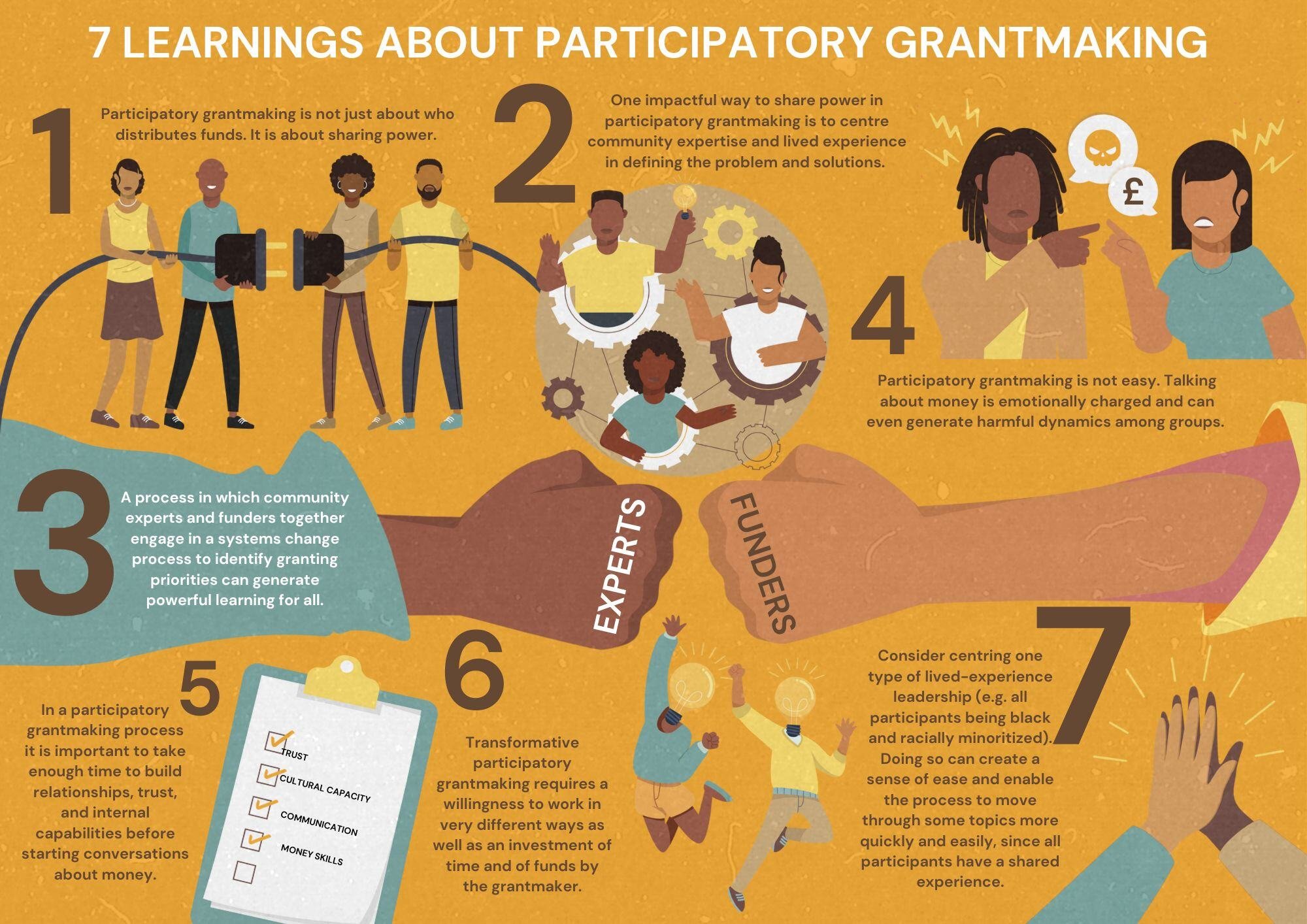Learn about how Reos Partners partnered with The Ubele Initiative and Impact on Urban Health to facilitate a unique social labs process that explored participatory grantmaking with Black communities in the UK.
LATEST REPORTS:
01. Processes for Black Led Systems Change
02. Exploring Funding, Power and Participatory Grantmaking
03. Understanding Safety for Black Communities
Overview
In seeking to explore funding, power and participatory grantmaking with Black communities, Impact on Urban Health (IoUH) initiated a process that engaged a group of community leaders in a participatory process focused on the shared challenge of safety (lack of) for Black and racially minoritised communities in Lambeth and Southwark.
The process, termed ‘The Black Systemic Safety Fund’ was designed and facilitated by The Ubele Initiative and Reos Partners using a social lab approach. It consisted of six workshops, with participant-led learning journeys, prototyping sessions, and reflective interviews in between. The overall process took 18 months and spanned from July 2022 to December 2023.
The challenge
Given the historical and ongoing marginalisation and systemic inequities faced by Black and racially minoritised communities, it was particularly important to assess the applicability and usefulness of these methods within minoritised communities.
By understanding how to best adapt methods we can work towards cultivating an environment conducive to the thriving of Black and racially minoritised communities and experts in such settings. This entails understanding how methods should be adapted and tailored to better suit their needs.
What does Black led systems change look like? What value might it bring to consider such an approach? Systems change efforts can be complex and challenging. It is therefore crucial to gain a deeper understanding of how to effectively facilitate change.
Our approach
The Black Systemic Safety Fund adopted the social labs approach. A social lab is an experimental process that brings together diverse stakeholders to tackle a complex social issue. Since the majority of local community experts were themselves Black and racially minoritised, the social lab process differed somewhat from other labs run by Reos Partners, and was adapted to meet the needs of a Black-led systems change initiative. For this particular process, facilitators adopted a series of participatory methods which centred on the use of music, art, play and creativity as a means of moving through ‘stuck problems’.
Core to the initiative has been an emphasis on centring Black and racially minoritised community leaders as experts in thinking about and addressing systemic challenges. The Black community leaders were compensated for their insights, expertise and engagement with the Systemic Safety Fund process, and then given a further £500K directly to collectively develop and resource a range of interconnected prototypes, solutions and initiatives aimed at tackling the systemic barriers to safety within their local communities.
Reports
In a short report series, we highlight key insights relating to three specific focus areas, ‘Safety’, ‘Funding, Power and Participatory Grantmaking’, and ‘Processes for Black Led Systems Change’. In the reports we share what we learned about these various topics, and what questions can help guide future processes.
01. Processes for Black Led Systems Change
02. Exploring Funding, Power and Participatory Grantmaking
03. Understanding Safety for Black Communities
Infographic on Black Led Systems Change:

Infographic on Participatory Grantmaking Learnings:

Infographic on Community Understandings of Safety:


Illustrations by Drew Sinclair
Prototypes
In the lab, communities of experts explored the root causes of a selected issue and jointly designed and tested prototypes and solutions to a shared challenge—both in the lab itself and beyond. As the prototypes were tested in the real world, new data and insights emerged, and solutions were refined and tested further as part of a continuous cycle of improvement.
Participants from the social lab came up with four different prototypes to address black systemic safety:
01 | Black Ofsted: Race Equity in Education
The Race Equity in Education group designed a project that aims to explore and address the systemic issues of racial injustice within the education system. It acknowledges the existence of racial disparities in education and aims to address them by implementing policies and practices that promote equality, fairness, and safety. In the next phase of the project, the group hopes to uncover issues and challenges within the education system that currently prevent Black pupils from feeling valued, respected and protected from discrimination, harassment and other forms of harm and implement the measures needed to create sustained change. This will be done in three stages: Stage 1. Round table talk discussions, Stage 2. Information gathering, analysis, sharing and evaluation, and Stage 3. The development and execution of a case study. Through this approach, the group will lay a solid foundation for embedding race equity in education and creating a more equitable and inclusive educational system for all.
In the long term, the Race Equity in Education Project aims to bring about significant changes, including:
Culture Shift: Transforming the prevalent white supremacy culture within educational institutions to one that is inclusive, supportive, and empowering for Black children.
Mental Models: Shifting the perspectives and attitudes of educators, administrators, and pupils to cultivate understanding, empathy, and equity.
Institutional Practice Reform: Revising policies and implementing institutional practices that embed trust and belonging for Black individuals, both within and outside the education system.
Thriving Black Youth: Empowering Black pupils to thrive academically, emotionally, and socially, contributing to their overall safety, success and well-being.
02 | Wakanda Assets
This initiative aims to address systemic barriers to safety and has been inspired by the experiences of local leaders in the group who have lost their own resources and access to assets (e.g., community buildings) as a direct result of having critical funding withdrawn altogether or cut very suddenly, thus hampering their capacity to deliver key services that enhance the safety of Black communities.
Phase 1 of the project builds upon the foundation laid by The Ubele Initiative Agbero 2100 project. This phase focuses on extending the project's reach to four organisations in Lambeth and Southwark, which have already secured physical infrastructure. By leveraging existing assets and amplifying community capabilities, Phase 1 aims to enhance economic sustainability. The overall goal is to strengthen the longevity of community-owned and led assets in these areas, thereby fostering resilience and self-reliance.
In Phase 2, the project shifts its focus towards enhancing community safety for Black individuals residing in Southwark and Lambeth. This involves providing professional advice and practical support to address a wide range of issues, including racism, discrimination, education, employment, housing, benefits, social services, and access to culturally appropriate mental health and wellbeing support. By tackling these multifaceted challenges, Phase 2 seeks to create safer and more inclusive environments where individuals can thrive and prosper.
Through these strategic interventions, the Wakanda Assets Group aims to create vital infrastructure through practical and positive change, promoting economic empowerment, social justice, and overall well-being within Black and racially minoritised communities.
03 | Reimagining Funding
The Reimagining Funding Group, composed of six Black and racially minoritised leaders from Lambeth and Southwark, is dedicated to equitable grant funding. The group developed the Grant Funding Draft System (GFDS) to foster collaboration among funders and address structural weaknesses in the funding system. Core to the GFDS has been the development of a model which aims to:
Address and remedy power imbalances in the relationship between funders and local community organisations as grantees.
Advance an approach that moves away from “charitable” approaches rooted in a deficit model, and towards a more equal relationship rooted in partnership.
Move towards an approach emphasising reparations and rectifying historical injustices over philanthropic approaches rooted in paternalistic assumptions
To meet these aims, the GFDS proposes a ranking system for grant applicants based on eligibility, impact, innovation, and sustainability. This approach aims to enhance transparency, encourage funders to shift their intention to invest to address social issues, promote diversity, and foster collaboration and innovation within the grant-making process.
04 | Crime, Justice and Policing
A fourth prototype around Crime, Justice and Policing has also been proposed, and participants have reserved a portion of funding to do further thinking around how they might collectively tackle what they acknowledge to be a very important safety issue for Black and racially minoritised communities in Lambeth and Southwark.
This decision to pool funding to return to a focus on crime, justice and policing at the end of the process (i.e. in the final residential and beyond) has been an important insight in itself. Black community leaders have valued the opportunity to consider safety beyond a narrow lens inflected by whiteness and white systems but also recognise the importance and urgency of tackling issues in this arena on their own terms, having had the space to be unburdened by this expectation.
Webinars